SUMMARY
This is AI generated summarization, which may have errors. For context, always refer to the full article.
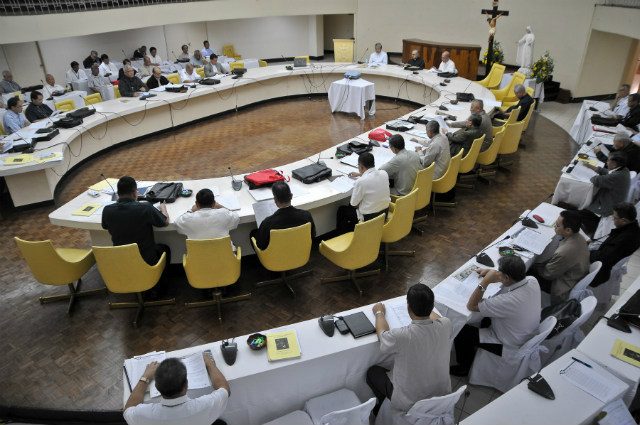
MANILA, Philippines – Five days before a bloodbath plunged the President in his worst political crisis, one of his staunchest critics requested the Catholic Bishops’ Conference of the Philippines (CBCP) to join him in a “noble enterprise.”
Reading from a 5-page statement, Lipa Archbishop Ramon Arguelles urged bishops on January 20 to support the National Transformation Council (NTC).
Since August 2014, the NTC has pushed President Benigno Aquino III and his administration to “step down and allow a non-partisan transitional council to take over.” This council is supposed to “fix the broken constitutional and political system” before the Philippines holds its next elections.
In urging Aquino to quit, the NTC cites the allegedly “fraudulent electoral process” that allowed him to win the presidency. It also points out “unconstitutional and illegal acts,” such as supposedly bribing congressmen to support the Reproductive Health (RH) law, a Church-opposed birth control measure, and to oust then chief justice Renato Corona, who now belongs to the NTC.
Arguelles said the NTC has around 25 members, including former officials under the late dictator Ferdinand Marcos and detained former president Gloria Macapagal Arroyo. (READ: ‘Aquino quit’ group: We have no leader, financier)
Speaking to Rappler on Monday, February 23, Arguelles said a number of bishops congratulated him after his speech before the CBCP’s plenary assembly, its highest decision-making body.
Still, the CBCP would not heed the NTC’s appeal.
It’s unlike the situation 29 years ago. On February 25, 1986, millions of Filipinos ended a peaceful rebellion along the Philippine capital’s main highway, EDSA, to overthrow dictator Ferdinand Marcos with the help of Catholic bishops. In February 2015, despite calls for Aquino’s resignation, only a few hundred Filipinos trooped to the streets to call on Aquino to quit.
In a sense, however, it’s also like 1986. Government critics, again, are seeking out bishops to give their movements a “moral basis.” Stressing that this involves morality and not only politics, a number of bishops, on the other hand, lend their clout to government critics such as the NTC.
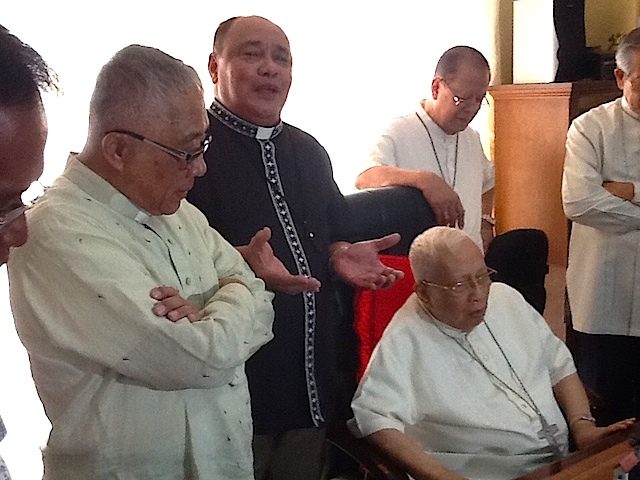
‘No collective position’
Unlike Arguelles and 5 other bishops, the CBCP did not urge Aquino to quit even after the President’s biggest controversy erupted on January 25. (READ: Did heaven send Aquino a message?)
This crisis involves the police operation in Mamasapano, Maguindanao, that killed 44 members of the Philippines’ elite police force, 18 Muslim rebels, and at least 3 civilians, based on official reports. Other reports say as many as 5 or even 7 civilians have been killed.
On February 4, the CBCP through its president, Lingayen-Dagupan Archbishop Socrates Villegas, acknowledged that “some members of the Philippine Catholic hierarchy” want Aquino to quit.
The CBCP, however, said it has “not arrived at a collective position” on this. The group added it “cannot morally join” calls for Aquino’s resignation until it gets all the facts it needs.
On February 15, days after Senator Miriam Defensor Santiago exposed an alleged coup plot, the CBCP also rejected “extra-constitutional measures” that “will only visit more harm and misery on our people.”
On February 16, Senator Antonio Trillanes IV named the person allegedly masterminding a coup against Aquino: NTC member Norberto Gonzales, a former defense secretary and national security adviser under Arroyo.
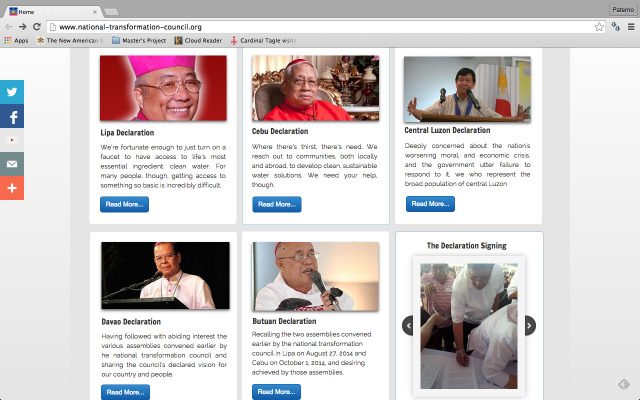
Moral authority
A look at its homepage – its layout, that is – shows where the NTC draws its authority.
Its centerpiece includes the photos of 5 personalities, mostly Catholic bishops. Below each of their photos is a link to an unsigned anti-Aquino “declaration.”
The first featured personality is Arguelles.
Arguelles is the bishop Aquino complained to Pope Francis about. On January 16, Aquino told the Pope a prelate “admonished” him “to do something” about his balding hair, “as if it were a mortal sin.” Arguelles said in 2012 that Aquino “should wear a wig,” among other things, to improve the way the public views him.
In 2013, Arguelles also launched a “Team Patay” (Team Death) campaign against senatorial candidates who support the RH law, which Aquino approved.
Second is Cebu Archbishop Emeritus Ricardo Cardinal Vidal, once the CBCP president who called for a peaceful struggle against Marcos in 1986.
Third is Davao Archbishop Emeritus Fernando Capalla, one of Arroyo’s former advisers.
Fourth is Butuan Bishop Juan de Dios Pueblos, who reportedly requested a sports utility vehicle from Arroyo as a birthday gift in 2009. He also called on Aquino to resign as early as 2011.
Fifth is Gonzales.
Arguelles, Capalla, and Pueblos, along with civilian leaders like Gonzales, called for Aquino’s resignation in Cebu on February 13. Bishop Ramon Villena of Bayombong, Bishop Filomeno Bactol of Naval, and Archbishop Romulo de la Cruz of Zamboanga joined their call as well.
Several news agencies reported that Vidal called for Aquino’s resignation, but his personal secretary clarified that the cardinal was misquoted. His secretary, Fr Joseph de Aquino, said Vidal did not tell Aquino to quit.
Gonzales said bishops, in any case, provide a “moral basis” for the NTC. He said in Batangas on Thursday, February 26: “Now I feel very holy because I have our faith communities guarding our back. How safe can you get?”
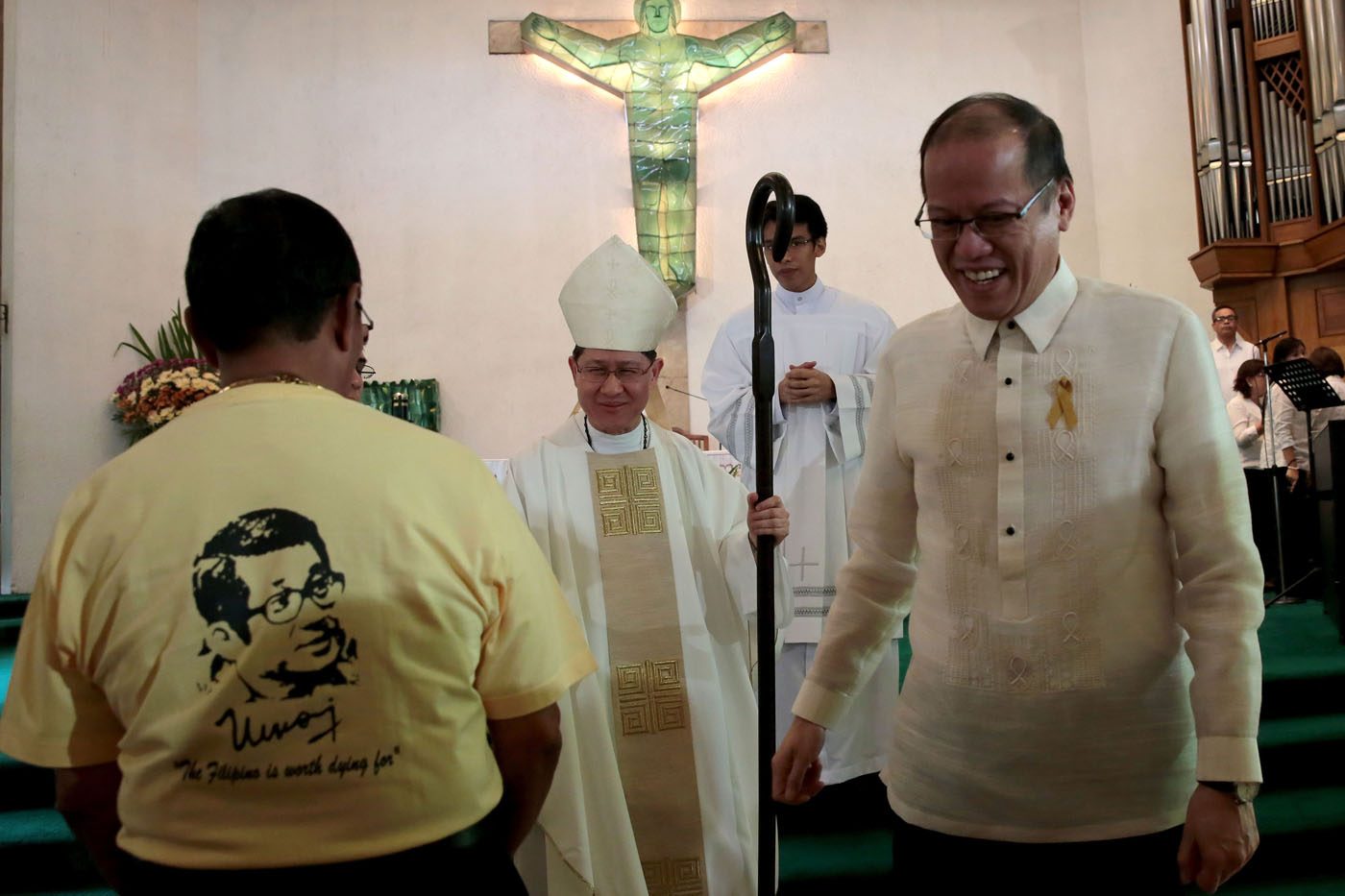
Politics has ‘moral dimension’
Morality, the Catholic Church says, is the reason it involves itself in politics.
In its Catechism on the Church and Politics, the CBCP in 1998 stressed 3 points as the basis for the Catholic Church’s “mission” in politics:
-
“First, because politics has a moral dimension. Politics is a human activity. It may hurt or benefit people. It can lead to grace or to sin.”
-
“Second, because the Gospel and the Kingdom of God call the Church to political involvement. To proclaim the gospel to all creation necessarily includes evangelizing the political world.”
-
“Third, because the mission of the Church of integral salvation involves the political sphere. Integral salvation is the salvation of the total person, soul and body, spiritual and temporal.”
The CBCP cited morality, for instance, when it denounced the “unparalleled” fraud in the Philippines’ 1986 snap elections that saw the victory of Marcos over the incumbent President’s mother, Corazon.
This CBCP statement on February 13, 1986, helped usher in the People Power Revolution that ousted Marcos on February 25, 1986.
Vidal, then the CBCP president, said in a post-election statement in 1986: “According to moral principles, a government that assumes or retains power through fraudulent means has no moral basis.”
The fraudulent elections prompted Vidal to call for a “non-violent struggle for justice.”
Days later, Manila Archbishop Jaime Cardinal Sin called on Filipinos to help protect Fidel Ramos, then Philippine Constabulary chief and later Philippine president, and Juan Ponce Enrile, then defense minister and later senator, who withdrew their support for Marcos.
This turned into the People Power Revolution that forced Marcos to quit and leave the Philippines.
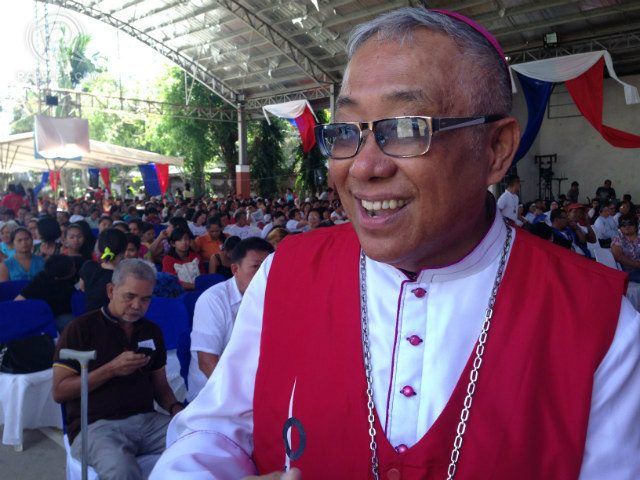
‘Very, very, very exceptional’ cases
Fast-forward to 2015, bishops find themselves in a similar situation. Should they call for Aquino’s resignation?
In a forum at the Loyola School of Theology on February 18, former Philippine Ambassador to the Vatican Henrietta de Villa posed a related question to Fr Gustavo Irrazabal, a professor of moral theology at the Pontificia Universidad Católica Argentina.
De Villa asked Irrazabal, “Will it be a part of the prophetic discourse to work for, to ask for the overthrow of the government?”
Irrazabal said it is, “according to the tradition of the Church, in very, very, very exceptional situations of intolerable tyranny and injustice.”
“Only then, and if there’s any probability of success….I think what you have in mind is not the case,” Irrazabal said, eliciting laughter.
The NTC’s Arguelles, for his part, argued that Aquino’s actions involve a “moral question.” Referring to the 44 slain police officers in Mamasapano, the bishop said: “This is not politics. This is morality. When 44 people get killed uselessly, that’s morality.”
Bayombong Bishop Ramon Villena, who also belongs to the NTC, added that Aquino should quit because his actions have “shown him unworthy of public trust.”
In a statement sent to Rappler on Saturday, February 28, Villena said Aquino “effectively bribed senators” to dismiss then chief justice Corona from office. He also “authored and schemed with his budget secretary the criminal misuse of public funds” through the Disbursement Acceleration Program, parts of which the Supreme Court declared as unconstitutional.
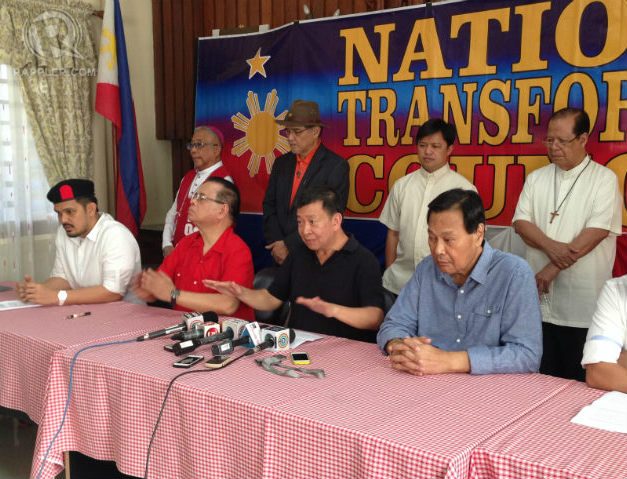
‘Convict me of sedition’
Villena also reacted to a statement by Justice Secretary Leila de Lima on Sunday, February 22. De Lima said the government “will not relent in applying the full force of the law” against the NTC “to protect the people and the State from an unconstitutional and illegal power grab.”
“I challenge Secretary De Lima to convict me of sedition. I am ready to go to prison perhaps together with Archbishop Ramon Arguelles of Lipa, so that by then we can serve the poor in prison,” Villena said.
Other bishops, while holding Aquino accountable for the Mamasapano operation, refuse to call for his resignation. The CBCP’s recent statements – one saying it “cannot morally join calls” for Aquino’s resignation, and another rejecting “extra-constitutional measures” – serve as their collective position.
Cebu Archbishop Jose Palma also issued a statement that seems to echo a note from the Vatican on November 24, 2002. The note – issued by Cardinal Joseph Ratzinger, then prefect of the Congregation for the Doctrine of the Faith and later Pope Benedict XVI – sought to clarify “the participation of Catholics in political life.”
In this doctrinal note, the Vatican said: “It is not the Church’s task to set forth political solutions – and even less to propose a single solution as the acceptable one – to temporal questions that God has left to the free and responsible judgment of each person. It is, however, the Church’s right and duty to provide a moral judgment on temporal matters when this is required by faith or the moral law.”
Palma, a former CBCP president, said the Catholic Church “respects the opinions and sentiments of the citizens who are calling for the President’s resignation.”
“However,” Palma said, “the Church is not in the position to issue such political statements for it is beyond her competence.” – Rappler.com
Add a comment
How does this make you feel?
There are no comments yet. Add your comment to start the conversation.